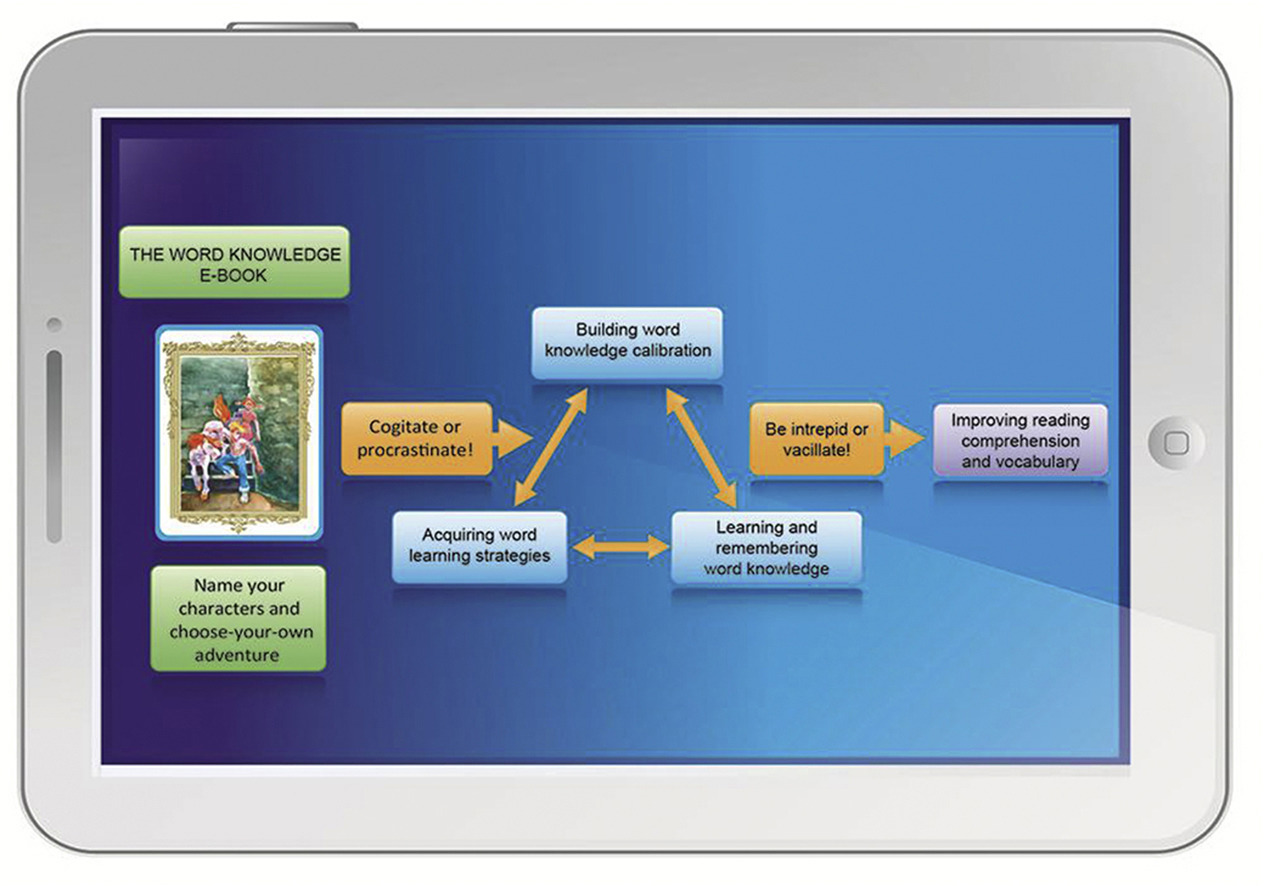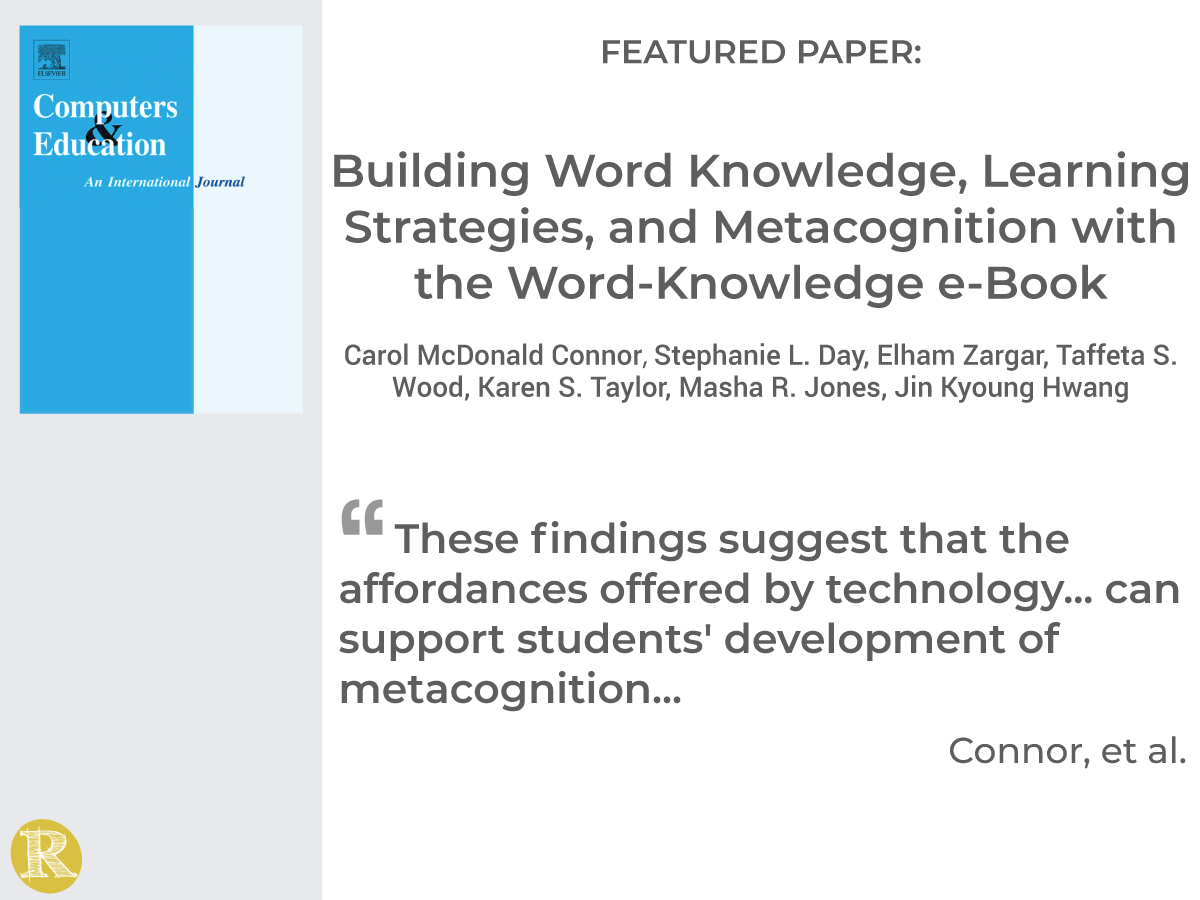Reading Comprehension is a Critical in Today’s Information-Based Society
UC Irvine Study Seeks to Improve Student Outcomes
In a 2018 Computers & Education paper, Connor, et al. studied the potential impact of technology on learning opportunities provided in the classroom. The study was funded by the Institute of Education Sciences, a part of the US Department of Education. The randomized controlled trial included 603 students in 25 third- through fifth-grade classrooms. A new edTech platform was developed, the Word Knowledge e-Book (WKe-Book). The researcher’s goal was to increase students’ metacognition, strategy use, word learning, and persistence in reading even when the text was challenging.
The authors note, “Reading comprehension is a critical skill in today’s information-based society. Evidence suggests that this is a teachable skill (NICHD National Reading Panel, 2000), yet one that too many students fail to achieve. By fourth grade, one-third of America’s children fail to read proficiently (NAEP, 2015). Poor reading comprehension represents a serious problem and is associated with higher rates of referral to special education, juvenile delinquency, and school dropout (Reynolds, Temple, Robertson, & Mann, 2002).”
The Study
 The authors used learning science and cognitive and developmental psychology research to develop the new WKe-Book technology. Their goal was to improve the students’ skills associated with reading comprehension.
The authors used learning science and cognitive and developmental psychology research to develop the new WKe-Book technology. Their goal was to improve the students’ skills associated with reading comprehension.
The WKe-Book is a choose-your-own adventure book. Reader choice influences character names, gender, and words which determines the story plot. Game-like consequences were integrated for students that failed to monitor their understanding of the text.
Results
The authors report that “Results revealed a significant treatment effect of the WKe-Book on students’ word knowledge, word knowledge calibration, and strategy use, which predicted student performance on standardized reading.” Student use of the WKe-Book is associated with stronger reading comprehension and vocabulary skills.
The results show the use of well-designed technology can augment face-to-face instruction. These third through fifth graders learned and retained very difficult words selected from SAT and ACT word lists. Further, “These findings suggest that the affordances offered by technology, which are unavailable in paper-based books, can support students’ development of metacognition, including word knowledge calibration, strategy use, and word learning skills.”
WKe-Books and Readability
When the students return to school, Carol Connor and her team plan to add Readability Features to the current WKe-Book study. The goal is to understand the effect of changing text features in the WKe-Book on students’ reading fluency and understand which features are more effective for individual student populations.
“As a researcher, I am excited to explore the benefits of personalized reading formats for children. Readability Features may be an important new tool for educators in the area of individualized instruction.”
Carol Connor, PhD, Chancellors Professor
School of Education, University of California, Irvine
Impact to Readability
Readability Matters is excited about our partnership with Carol Connor and her team. Education is a high-value use case for Readability improvements. We look forward to demonstrating the impact of personalized text on fluency and comprehension in this elementary school population. Our goal is to see these infrastructure features added to edTech platforms like Wke-Books, to enhance student learning.
The paper’s abstract is included below and the full paper is available from the National Institute of Health.
Building word knowledge, learning strategies, and metacognition with the Word-Knowledge e-Book
Carol McDonald Connor∗, Stephanie L. Day, Elham Zargar, Taffeta S. Wood,
Karen S. Taylor, Masha R. Jones, Jin Kyoung Hwang
ABSTRACT
Many children fail to comprehend what they read because they do not monitor their understanding, which requires making accurate judgements of what they know and then employing repair strategies when comprehension fails. Relying on research from learning science and cognitive and developmental psychology, we developed the Word Knowledge e-Book (WKe-Book) to improve children’s calibration of their word knowledge, strategy use, and word knowledge overall; skills which are associated with reading comprehension. The WKe-Book, which is read on a tablet computer, is a choose-your-own adventure book where choices require choosing between two rare words (e.g., cogitate vs. procrastinate). Depending on the word chosen, the story follows a different plot. There are also embedded comprehension questions where students receive immediate feedback with consequences for incorrect answers, such as being sent back to reread a few pages. In a randomized controlled trial, we tested whether students (N = 603 in 25 third through fifth grade classrooms in Arizona in the US) reading the WKe-Book would demonstrate improved word knowledge, strategy use, and word knowledge calibration. Classrooms were randomly assigned to read the WKe-Book immediately (treatment) or later (delayed-treatment control), and within classrooms, students were randomly assigned to either participate in a 15-minute weekly book club (book club treatment) or to read the WKe-Book independently with no book club (no book club control). Results revealed a significant treatment effect of the WKe-Book on students’ word knowledge, word knowledge calibration, and strategy use, which predicted student performance on standardized reading comprehension and vocabulary measures. The effects were greater for students who participated in weekly book clubs compared to students in the no book club control. These findings suggest that the affordances offered by technology, which are unavailable in paper-based books, can support students’ development of metacognition, including word knowledge calibration, strategy use, and word learning skills.




